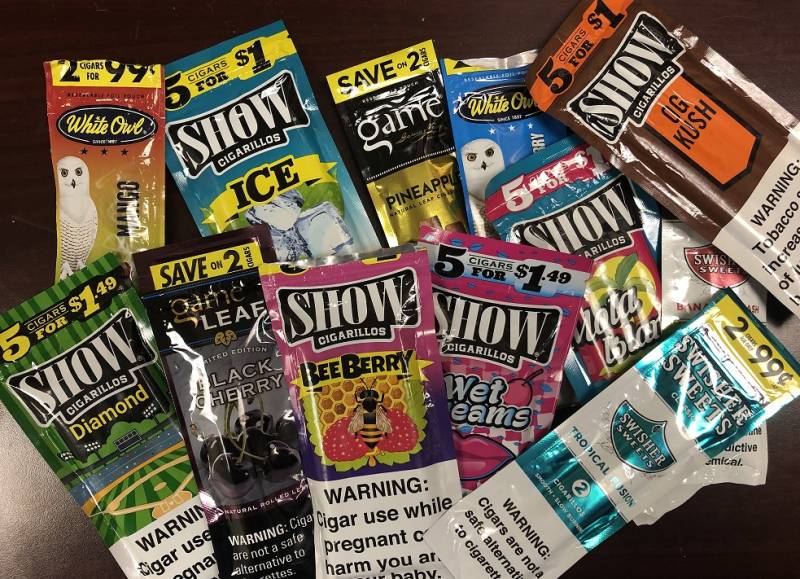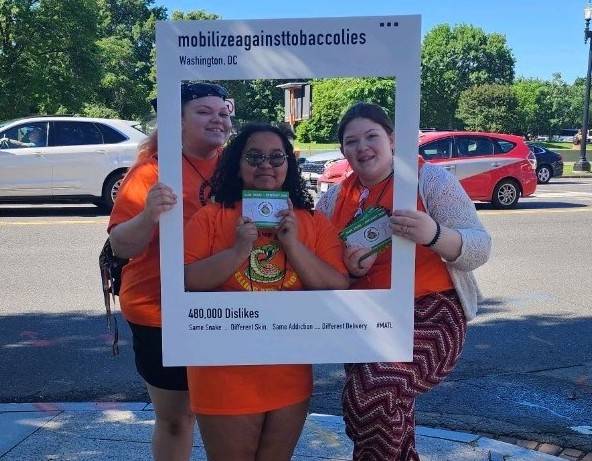Halloween and youth health news: candy flavored cigars are 'big tobacco’s' trick, not a treat

Press Release:
Berry Fusion, Maui Pineapple, and Cherry Dynamite. These are the candy flavors many young ghouls and ghosts will get while trick-or-treating this Halloween. They are also the same flavors our teens see in flavored little cigars and cigarillos marketed alongside candy at convenience stores and gas stations in their communities.
“They may sound like Halloween treats, but in reality they are Big Tobacco’s tricks for getting kids hooked on their products,” says Brittany Bozzer, Reality Check Youth Coordinator for Tobacco-Free Genesee, Orleans and Wyoming Counties (TF-GOW).
Cigarillos, the more popular product, are short and narrow cigars that usually do not include a filter. Little cigars are the same size and shape as cigarettes, often include a filter, and are packaged in a similar way. Both are taxed differently than cigarettes.
Why flavored cigars are a concern.
Bozzer and other public health leaders across the GOW region, New York State and the country are particularly concerned with the newest generation of cigars, including brand names like Swisher Sweets, Dutch Masters, Phillies and Black & Milds. A Swisher Sweet cigarillo contains about 10.8 milligrams of nicotine per gram of tobacco. That’s more than a cigarette, which typically average 8 milligrams, and fuels youth addiction.
“Our biggest concern is that the sweet flavors improve the taste and mask the harshness of tobacco, making these products easier to use and more appealing to young people,” says Bozzer. “Flavors in cigars means more youth will start smoking them, progress to become regular users and potentially become addicted.”
According to 2023 study from the Truth Initiative, flavors are a major reason why young people use cigars, with 74% of adolescents who used cigars in the past month indicating that they used them “because they come in flavors I like.”
What they don’t know is that these cigars contain the same addictive, toxic and carcinogenic compounds found in cigarettes. Similar to e-cigarettes, cigars are sometimes marketed as being a healthier alternative to cigarettes but that is untrue. Health risks of flavored cigar smoking include gum disease, cancers of the larynx, esophagus and lungs, with daily cigar smokers having an increased risk of heart disease and chronic obstructive pulmonary disease.
Co-use of cigarillos and marijuana.
Studies show that many young people use cigarillos as “blunts,” a term for a cigar emptied of its tobacco and replaced with marijuana. Brands like Backwoods (Imperial Tobacco Brands LLC) even have product features, like honey, Russian creme and dark stout flavors, that enhance the blunt smoking experience as featured in the brand’s Instagram posts. Researchers believe this co-use behavior may play a role in promoting increased tobacco use and nicotine dependence.
Marketing to youth.
As new flavored cigars flood the marketplace, tobacco companies market them in bright, colorful packaging mimicking candy which threatens our teens, as well as New York State’s efforts to reduce tobacco use. According to a report from the Campaign for Tobacco-Free Kids, companies have also tricked us and our children by avoiding regulations, including new product marketing restrictions and tobacco taxes, contributing to the ongoing problem of youth use.
Cigar manufacturers use many strategies to attract young people including emphasizing flavors in advertisements, paying to place them on store countertops, engaging in fun and engaging social media trends, keeping prices low and introducing new and limited-edition flavors such as “harvest blend,” “summer fusion,” “sticky sweets” and “spiced rum.”
Good news: FDA proposes rule prohibiting flavored cigars.
In April 2022, the Food and Drug Administration (FDA) announced a proposed rule to prohibit all characterizing flavors in cigars based on clear evidence that all cigars increase health risks, but particularly, flavors. The rule noted that flavors increase the appeal of cigars and make them easier to use, especially for youth, and that removing flavored cigars from the market would reduce the number of youth who smoke cigars.
Why the FDA must act NOW.
- Sales of all cigars more than doubled between 2000 and 2021, largely driven by increased sales of smaller types of cigars, many of which are flavored.
- More than a half million youth in the U.S. use flavored cigars, and in recent years more young people tried a cigar every day than tried a cigarette.
- The hundreds of flavored cigars make up about half of the cigar market and can be as cheap as 3 for 99 cents.
- In recent years, cigar makers have also introduced limited edition products described as “new” in flavors likely to be extremely appealing to youth.
Preventing tobacco use among youth is a priority because tobacco is the leading cause of preventable death in the world.
This Halloween, let’s hope the FDA will give us a real treat and ban flavored cigars before they hook a new generation of smokers.
Reality Check is a teen-led, adult-run program that seeks to prevent and decrease tobacco use among young people throughout New York State.
For more information about Reality Check, visit realitycheckofny.org.

